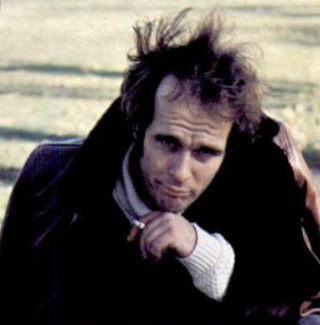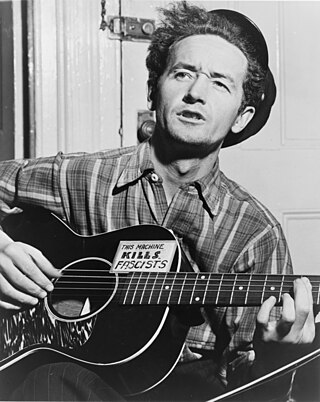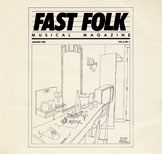Anti-folk is a music genre that emerged in the 1980s in response to the 1960s folk music scene. Anti-folk music was made to mock the perceived self-seriousness of the time's mainstream music scene, and artists have the intention to protest with their mocking and clever lyrics.
Music of Utah has long been influenced culturally by the Church of Jesus Christ of Latter-day Saints. The local music scene thrives. The musical history of Utah, and much of its current distinctiveness, is owed to artists from a variety of beliefs.

Hugh Blumenfeld is an American folk musician and singer-songwriter from Connecticut. He was born in Jamaica, Queens, New York City, graduated with degrees in Biology and Humanities from M.I.T. in 1980, and got a master's degree in English Literature from the University of Chicago in 1981. He was active in the Greenwich Village music scene in the 1980s, attending the Cornelia Street Songwriters Exchange and performing at Folk City and Speak Easy while working on a PhD in Poetics from New York University. He also helped to edit the Fast Folk Musical Magazine and recorded songs for a dozen issues. After earning his PhD in 1991, he worked as an English professor until 1994, when he began writing and performing full-time. Over the next 10 years he toured mainly in the Northeast and Midwest, with several short tours in Europe and one in Israel. In 1999 he was appointed Connecticut State Troubadour.

James Timothy Hardin was an American folk and blues songwriter. As well as releasing his own material, several of his songs, including "If I Were a Carpenter" and "Reason to Believe", became hits for other artists.

Fred Neil was an American folk singer-songwriter active in the 1960s and early 1970s. He did not achieve commercial success as a performer and is mainly known through other people's recordings of his material – particularly "Everybody's Talkin'", which became a hit for Harry Nilsson after it was used in the film Midnight Cowboy in 1969. Though highly regarded by contemporary folk singers, he was reluctant to tour and spent much of the last 30 years of his life assisting with the preservation of dolphins.

John Gorka is an American singer-songwriter. In 1991, Rolling Stone magazine called him "the preeminent male singer-songwriter of what has been dubbed the New Folk Movement."

Rod MacDonald is an American singer-songwriter, novelist, and educator. He was a "big part of the 1980s folk revival in Greenwich Village clubs", performing at the Speakeasy, The Bottom Line, Folk City, and the "Songwriter's Exchange" at the Cornelia Street Cafe. He co-founded the Greenwich Village Folk Festival, now a non-profit, and is still the President and co-producer of its events. He is perhaps best known for his songs "American Jerusalem", about the "contrast between the rich and the poor in Manhattan", "A Sailor's Prayer", "Coming of the Snow", "Every Living Thing", and "My Neighbors in Delray", a description of the September 11 hijackers' last days in Delray Beach, Florida, where MacDonald has lived since 1995. His songs have been covered by Dave Van Ronk, Shawn Colvin, Four Bitchin' Babes, Jonathan Edwards, Garnet Rogers, Joe Jencks, and others. His 1985 recording "White Buffalo" is dedicated to Lakota Sioux ceremonial chief and healer Frank Fools Crow, whom he visited in 1981 and 1985, and who appears with MacDonald in the cover photograph. Since 1995 MacDonald has lived in south Florida, where his cd, "Later that Night" was named "Best Local Cd of 2014" by The Palm Beach Post and reached the top ten in national roots music charts. His first novel, The Open Mike, about a young man in the open mike scene of Greenwich Village, was published on December 5, 2014, by Archway Publishing. On December 10, 2020, MacDonald released his 13th solo recording, Boulevard, on Blue Flute Music. On April 14, 2021, his second novel, The American Guerillas, was published by Archway Publications. On June 1, 2023, MacDonald's 14th solo album, Rants And Romance, a collection of 14 new songs and 3 by other songwriters, was released by Blue Flute Music, charting in the top ten on national folk music charts during the summer.

The Cornelia Street Cafe, was a restaurant & bar at 29 Cornelia Street in New York City's Greenwich Village, opened in July 1977. The cafe closed at the end of 2018, due to rising rents from the gentrification of the West Village; ending on its holiday closed day of New Years 2019. The cafe had been voted one of the best places to listen to jazz music in the world.

Eric Andersen is an American folk music singer-songwriter, who has written songs recorded by Johnny Cash, Bob Dylan, Judy Collins, Linda Ronstadt, the Grateful Dead and many others. Early in his career, in the 1960s, he was part of the Greenwich Village folk scene. After two decades and sixteen albums of solo performance he became a member of the group Danko/Fjeld/Andersen.

John Studebaker "Jack" Hardy was an American singer-songwriter and playwright based in Greenwich Village, who was influential as a writer, performer, and mentor in the North American and European folk music scenes for decades. He was cited as a major influence by Suzanne Vega, John Gorka, and others who emerged from that scene in the 1970s, 1980s, and 1990s. Hardy was the author of hundreds of songs, and toured for almost forty years. He was also the founding editor of Fast Folk Musical Magazine, a periodical famous within music circles for twenty years that shipped with a full album in each issue, whose entire catalog is now part of the Smithsonian Folkways collection.
Richard Meyer was an American folk singer-songwriter, writer, painter, and set designer. Meyer was active in the Greenwich Village folk music scene of the 1980s and 1990s and did much to promote other artists. As one of the leaders of a musicians cooperative in the Village he handled booking at the SpeakEasy and edited Fast Folk Musical Magazine (1986–1997). Later, he wrote reviews for various media such as AllMusic. He also worked extensively as a lighting/scenery designer in theater.

The American folk music revival began during the 1940s and peaked in popularity in the mid-1960s. Its roots went earlier, and performers like Josh White, Burl Ives, Woody Guthrie, Lead Belly, Big Bill Broonzy, Richard Dyer-Bennet, Oscar Brand, Jean Ritchie, John Jacob Niles, Susan Reed, Paul Robeson, Bessie Smith, Ma Rainey and Cisco Houston had enjoyed a limited general popularity in the 1930s and 1940s. The revival brought forward styles of American folk music that had in earlier times contributed to the development of country and western, blues, jazz, and rock and roll music.
Gerdes Folk City, sometimes spelled Gerde's Folk City, was a music venue in the West Village, part of Greenwich Village, Manhattan, in New York City. Initially opened by owner Mike Porco as a restaurant called Gerdes, it eventually began to present occasional incidental music. It was first located at 11 West 4th Street, before moving in 1970 to 130 West 3rd Street. The club closed in 1987.

Terri Ann Hendrix is an American singer-songwriter, multi-instrumentalist, and independent artist who has been writing and performing an eclectic mix of Americana genre, encompassing folk, pop, country, blues, and jazz, since 1990. Since 1988 Hendrix has been based in and near San Marcos, Texas, living as of 2017 in nearby Martindale, after growing up in San Antonio, Texas.
Kirk P. Kelly is a folk singer, songwriter and labor activist from New York City. In the mid-1980s Kelly and a group of like-minded musicians started calling themselves "anti-folk" and started a small but intense movement. Kelly's music has been infrequently recorded over the years. His work has often included topical songs. Some of Kelly's early songs dealt with the labor movement and were based upon his own work experience. A decade or so after starting his musical career Kelly was accepted to and attended an AFL-CIO organizer's training school and began working throughout the United States as a union organizer.

Carol Patricia Mas, professionally known as Carolyne Mas, is an American singer-songwriter, guitarist, pianist, and producer. She broke out of the Greenwich Village music scene boom of the late 1970s, along with other artists such as Steve Forbert, The Roches, and Willie Nile. She is credited with having started the Songwriter's Workshop at the Cornelia Street Cafe in 1977, which later went on to become the Songwriter's Exchange, featuring singer-songwriters such as Jack Hardy and Suzanne Vega. Although she remains relatively unknown in the United States, except for a loyal cult of fans, she managed to gain popularity in Europe and Canada, mostly due to the use of television as a promotional tool in these markets. Her records did well in the charts in Canada, but her greatest success was in Germany, where a live album, Mas Hysteria, was released by Phonogram. It was originally intended to promote her upcoming appearance on Rockpalast in January 1981, and included her most significant hit, "Sittin' in the Dark".
Ken Lauber is an American composer, arranger producer, musician, singer and playwright.

Phil Ochs: There but for Fortune is a documentary film on the life and times of folk singer-songwriter Phil Ochs. The film, released theatrically in January 2011, was written and directed by Kenneth Bowser. Its title is taken from one of Ochs' best known songs, "There but for Fortune" (1963).
Gil Turner was an American folk singer-songwriter, magazine editor, Shakespearean actor, political activist, and for a time, a lay Baptist preacher. Turner was a prominent figure in the Greenwich Village scene of the early 1960s, where he was master of ceremonies at New York City's leading folk music venue, Gerde's Folk City, as well as co-editor of the protest song magazine Broadside. He also wrote for Sing Out!, the quarterly folk music journal.
Cliff Eberhardt is an American folk singer-songwriter. He is a founding member of the Fast Folk Music Cooperative in New York City. Eberhardt joined Red House Records in 1997 and has recorded five albums for the label, the most recent in 2009, 500 Miles: The Blue Rock Sessions. In 2011, he released an acoustic album of Doors songs, All Wood and Doors, with fellow musician James Lee Stanley on Beechwood Recordings. Also that year, he contributed a cover to Nod to Bob II, a Red House compilation honoring Bob Dylan on his 70th birthday.











